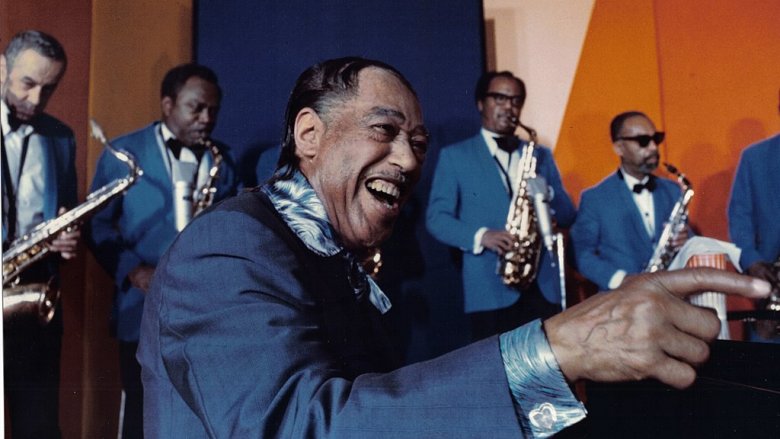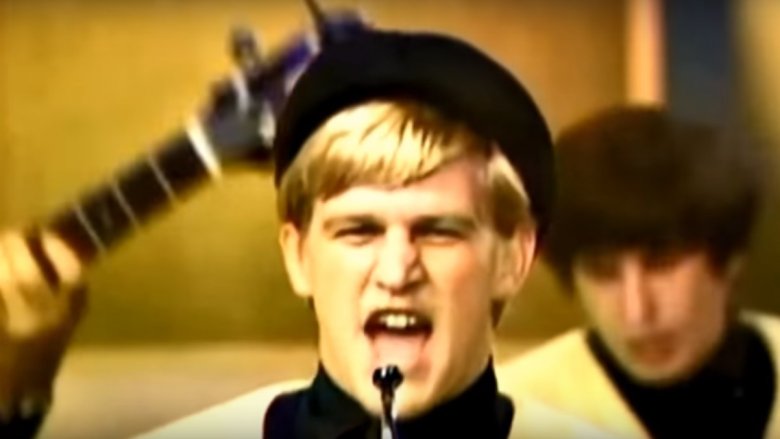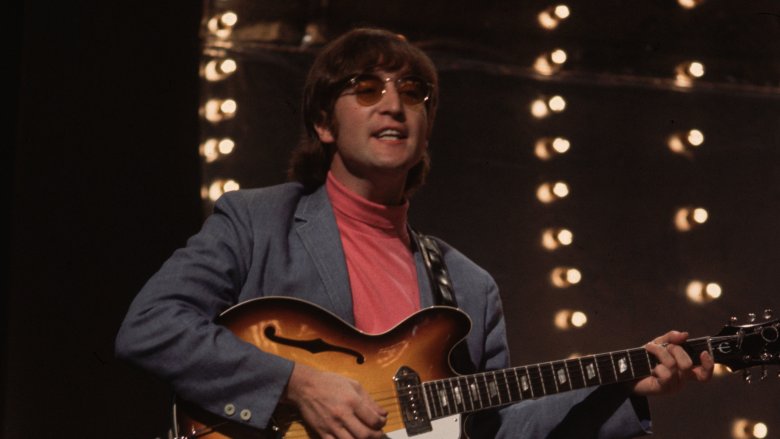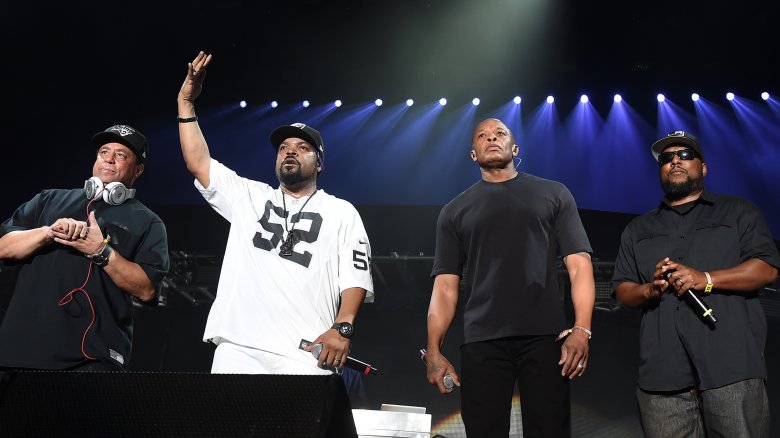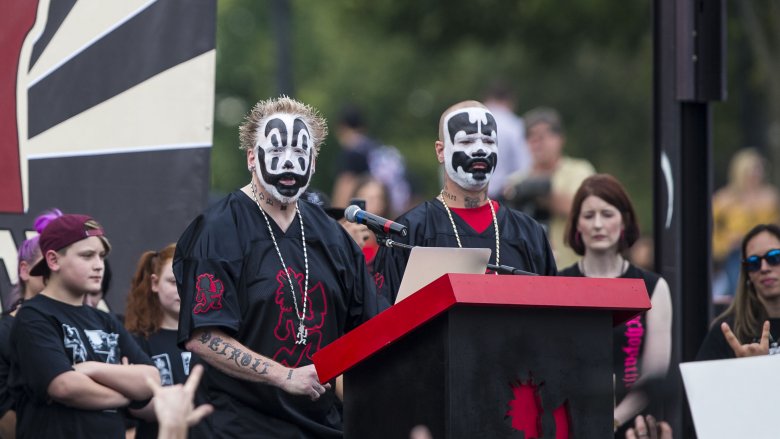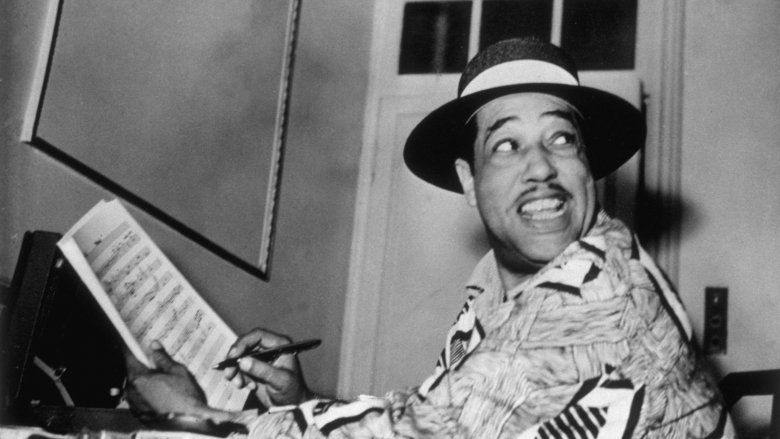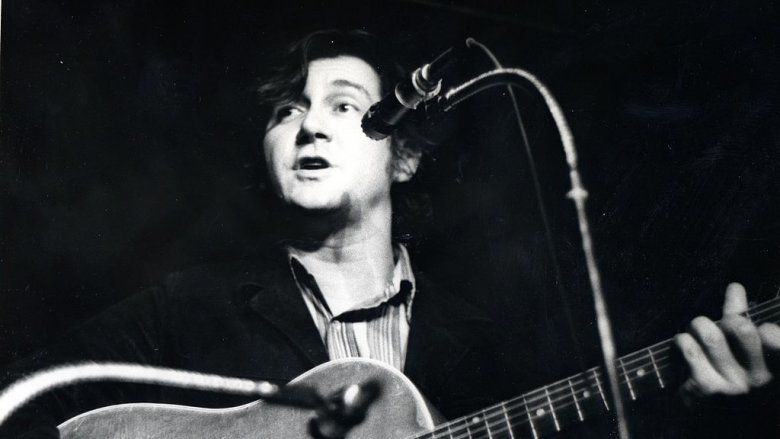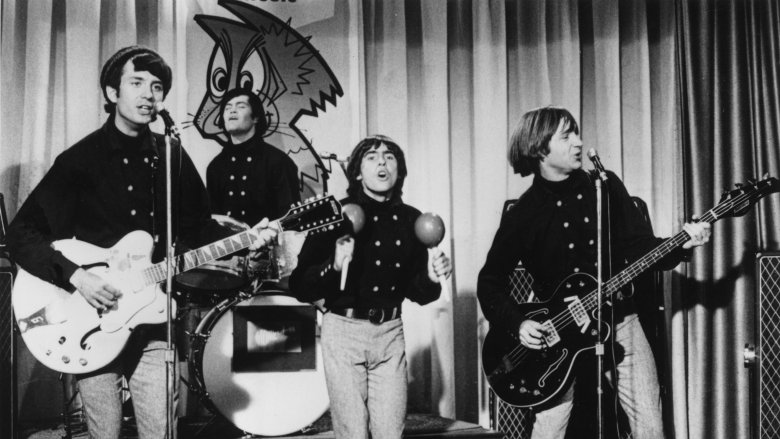Music That Triggered FBI Investigations
When it comes to music, the FBI hasn't historically been the nation's valiant protector so much as its been everyone's grouchy, hopelessly out of touch, often blatantly racist grandparent. When jazz, folk, rock, and hip-hop were quenching the public's thirst for disruption and all sorts of establishment-challenging goodness, feathers and flattop haircuts were being ruffled in Washington by the SUV-load. Where most saw cathartic expressions of creativity and truth, the FBI saw noisy degenerates who needed to get off America's lawn, pronto — or after a few decades of monitoring and harassment, in some cases.
The bulk of this activity took place when FBI Director J. Edgar Hoover unleashed his Counter Intelligence Program (COINTELPRO) in 1956, which aimed to "expose, disrupt, misdirect, discredit, or otherwise neutralize" groups seen as a threat to the status quo. The program ran until 1971, officially, but of course those same practices were being carried out before and after this period, with the feds wondering why we can't all just listen to some wholesome Christian hymns at a reasonable volume and be in bed by 10.
Not everything here developed into a full-blown investigation, with all its bumbling bureaucracy and mysterious lab work and a few small forests' worth of reports, but these musicians all got the G men's attention in one way or another. Let's get into it.
'Louie Louie' and the fear of the unknown
Everyone from Barry White to Black Flag have had a crack at Richard Berry's 1957 calypso classic, but it's the Kingsmen's 1963 version that most people know. Because it's groovy as hell, yes, but also because it prompted a whole heap of moral outrage and federal-level hysteria upon its release.
It wasn't by design. Singer Jack Ely had to contend with a mouthful of braces and a microphone that hung a little too high from the ceiling while recording, and the band played loud. The resulting vocals were mostly incomprehensible, but suggestive enough to send conservative parents and the moral-outrage-hungry FBI of the 1960s into tizzies.
After two years in the lab and a 119-page report, the investigation yielded diddly-squat in the way of anything concretely obscene. It's actually just a song about a sailor and a girl he really loves, but it didn't matter — the track's subversive nature had already become legend. Bands who covered it either mumbled their way through it or made up their own lyrics, and kids were hearing what they wanted to hear. Ely might as well have been reciting magic spells as far as anyone was concerned.
Best of all, there was a proper obscenity staring the feds right in their stony faces all along. That There's a muffled shout about a minute in that's supposedly drummer Lynn Easton exclaiming "f**k!" after having dropped his sticks. It's a wonder teenagers around the country didn't collectively pledge their allegiance to Satan right there on the spot.
The Almanac Singers: short lifespan, long shadow
A left-leaning, anti-war, pro-labor folk group featuring Pete Seeger (above) and Woody Guthrie, the short-lived Almanac Singers and the FBI were never quite going to be singing Kumbaya together around a campfire. Sure enough, the Almanacs were labeled a "seditious group" by the feds shortly after forming in 1941. The U.S. psyche was steeped in a heavy fog of paranoia at the time, and a barrage of negative publicity ultimately led to the group's disbanding in 1942.
Did Guthrie and Seeger continue their seditious ways? You bet. The former Almanacs remained tireless social activists and champions for progressive causes for the rest of their lives, and the bureau took notice. They kept their eye on Seeger for the next 20-odd years, and their mammoth 1,800-page file scrutinized everything from his musical performances to the "bohemian" clothes he wore in high school.
Guthrie got off a lot easier with a mere 122-pager, the most memorable section of which describes a federal agent's visit to his apartment in May 1943. The agent was there to ask Guthrie about Seeger's suitability for the army, and everything was going groovy until the agent noticed a guitar in the room rocking the inscription "This machine kills Fascists." His report concluded that the guitar "bears out the belief that the Almanac Players were active singing Communist songs and spreading propaganda."
John Lennon, the transatlantic thorn in the FBI's side
When John Lennon made New York his home during the early 1970s, the FBI wasted no time trying to send him back across the pond without so much as a welcome basket. J. Edgar Hoover himself wrote to President Nixon's Justice Department in 1972, warning of this "former member of the Beatles singing group" (adorable) and the potentially dangerous revolutionary views he espoused. He opposed the Vietnam War, he was fond of illicit drugs, and with Nixon's re-election campaign on the horizon they all thought it best to just send this pesky British hippie packing.
The former Beatle first found himself on the feds' naughty list in December 1971, as the Huffington Post reports, when he flew out to Michigan to perform at the Free John Sinclair rally. Poet, peace activist, and former MC5 manager John Sinclair was serving a 10-year sentence for the possession of two joints. People had been lobbying for his release for years, but it was Lennon showing up to the rally and performing the song "John Sinclair" that instigated immediate action; the Michigan Supreme Court saw some sense and ordered Sinclair released within a week.
Unbeknownst to Lennon, there were FBI informants in the audience taking notes, and they weren't about to let this one slide and chalk it up to a particularly bad case of reefer madness. The ensuing investigation went on for 12 months. Though they failed to deport him, Lennon's activism, music, and even his marriage all suffered as a result of the constant surveillance and harassment.
FBI, meet NWA
This investigation had nothing to do with who had the cooler acronym and had everything to do with a little ditty by the name of "F**k tha Police," NWA's incendiary 1988 protest anthem that heralded the dawn of the age of gangsta rap. Shockingly, bureau agents weren't exactly lining up for tickets, and they had a thing or two to say about those lyrics.
They reared their heads about a year after the track dropped, according to a Washington Post article at the time. Speaking on behalf of the whole bureau, the assistant director of the office of public affairs Milt Ahlerich sent a warning letter to the group's label, denouncing "F**k tha Police" — or at least that's the assumption; he never actually mentions the track by name. (The chance that he was referring to "Something 2 Dance 2" are pretty slim.) Ahlerich claimed the track was "degrading," that it encouraged violence and disrespect toward law enforcement, and he made it clear the FBI wouldn't stand for that kind of gosh-darned malarkey.
This never developed into a full-on investigation, and the feds even saw the need to clarify that they didn't intend to stifle or censor anyone's mode of creative expression. But merely landing in the bureau's steely gaze gave the group a sizable boost in popularity, and according to Ice Cube it urged them to speak out more loudly against the forces of tyranny and oppression they felt had gone unchecked for so long.
When the King was still the King
Before Ross and Rachel, there was Elvis and the FBI, one of the quintessential will-they-won't-they love/hate affairs of the 20th century.
Presley and the bureau crossed paths a number of times for a variety of reasons over the years. Mostly standard-issue stuff for his benefit, like when they investigated the blackmail attempts and death threats issued against him. And then in 1970, well and truly past his prime, he even offered to be a government agent and met with President Nixon to discuss the moral degradation of the country, according to Time. Rock 'n' roll indeed.
But it was those gyrating hips and burning loins that first got the bureau all hot and bothered more than a decade earlier. Presley's 683-page file dates all the way back to 1956, when Hoover received a letter from a Catholic newspaper editor describing one of the King's performances in Wisconsin as the "filthiest and most harmful production" the writer had ever seen. The concern was that Presley's sexual magnetism was driving his fans insane with hormonal hysteria, and this represented a genuine danger to the security of the United States. This was filed away but nothing much seemed to come of it, and Elvis didn't end up becoming a federal agent after all, so the relationship remained sadly unconsummated to the end.
The FBI makes the Insane Clown Posse look kind of sane
Considering the band's most well-known song is, in part, a sincere ode to the miracle of magnets, the ICP faithful are a surprisingly devoted bunch. Juggalos have attracted their fair share of ridicule over the years, warranted or not, and it's probably been suggested more than once that being a fan of the band should be a criminal offense. Well, thanks to the FBI, it actually kind of is.
Since 2011, the FBI has classified the Juggalos as a "loosely organized hybrid gang." That doesn't mean the feds are going to bust down your door for spinning "Hokus Pokus" one too many times (though we don't recommend testing this theory), but the duo have claimed that fans have experienced legitimate discrimination by employers, the military, the courts, landlords, and law enforcement as a result of the gang designation. They sued the FBI in 2014 in an attempt to set things straight. The suit was dismissed initially, then successfully appealed in 2015. They filed a new lawsuit, but that one was thrown out in December 2017.
There probably aren't many situations where you can comfortably say Violent J and Shaggy 2 Dope are the most reasonable adults in the room, but that does seem to be the case here. There are always going to be a few bad clowns in the clown car, but to saddle a whole fan base with a label this damaging seems like yet another instance of the long arm of the law poking around where it doesn't necessarily belong.
This Nine Inch Nails music video was just a little too convincing
Trent Reznor of Nine Inch Nails fame was probably just minding his own business circa late 1989, listening to sick industrial beats in the dark, thinking about black nail polish and how long it takes for a fox carcass to fully decompose, blissfully unaware of the very real FBI investigation into his supposed death that was going on at the time.
As recounted by Consequence of Sound, the original video for Nine Inch Nails' "Down in It" has Reznor playing a man who climbs a tall building, slips, and falls to his death. While shooting this portion, a camera attached to a helium balloon filmed Reznor's "dead" body from above. Unfortunately, the balloon broke away from the ropes holding it in place. The camera was later found by a farmer in Michigan, hundreds of miles away, and this poor sucker interpreted the footage as scraps from an actual snuff film. He reported it to authorities, who called the FBI, who launched a brief investigation into Reznor's supposed death.
After the feds determined the identity of the "body," Reznor's manager eventually found himself having to explain that the singer was, in fact, still of this earthly plane, and probably suggested tuning into MTV now and then to save some time in the future.
Duke Ellington dukes it out for nearly 40 years
The FBI's counter-intelligence program sought desperately to preserve the status quo by any means necessary back in the day, sniffing out and quelling disruptive thoughts, untucked shirts, and anything that vaguely resembled dissidence and communist sympathy. Black liberation and civil rights groups were hit particularly hard, and a number of sympathetic jazz musicians found themselves with a big metaphorical target on their backs, according to Jazz Times. Duke Ellington was one such undesirable, and he was dogged for a remarkably long time despite a relatively benign track record. This, obviously, was neither the bees knees nor the cat's pajamas.
Essentially, Ellington was investigated for endorsements and for performing at progressive benefits the feds deemed suspicious, starting with the All-Harlem Youth Conference in 1938. The focus of the conference was unemployment, and President Roosevelt had expressed support for it, but the FBI still saw fit to label it a "communist front" and Ellington a potential threat by association. In reality Ellington was adamantly anti-communist and made no bones about it, even penning a magazine article titled "No Red Songs for Me" in 1950. It didn't seem to make a bit of difference in Uncle Sam's eyes. He'd go on to be monitored for almost four decades.
Phil Ochs' justified paranoia
Throw a pair of penny loafers in any direction on the streets in New York in the '60s and you'd probably hit a politically active folk singer, but Phil Ochs might have been the most resolute of them all. The fact that he's mostly an unknown figure in today's musical and cultural landscape is a crying shame, but maybe not all that surprising considering the long, dark shadow the FBI had cast over his tragically short career.
Ochs had been convinced he was being monitored by the FBI for years, even slyly telling an audience in 1966, "As you know, I'm a folk singer for the FBI." People thought he was paranoid, delusional. He was an alcoholic, which some thought lent credence to that line of thinking. But he was absolutely right; the feds had been keeping an eye on him since the early '60s when he would perform his politically charged music at protest rallies. According to The Guardian, he was also mugged and strangled in Dar es Salaam in 1973, losing some of his vocal range as a result, and he'd always suspected that the U.S. government had been behind that one, too. Mindless paranoia? Well, we do know he was right about everything else.
Ochs committed suicide in 1976 at the age of 35. The feds investigated him right up to the end, but he never committed a federal crime. Here's hoping that an FBI file isn't the only legacy left by this undeniably relevant voice of reason in particularly unreasonable times.
They weren't just Monkeeing around
The Monkees always seemed like the kind of clean-cut, wholesome boy band you wouldn't mind introducing to your parents, safe in the knowledge that any one of those fun-loving Monkees would always have you home by whatever time your parents said and that they'd send you flowers the next day. But in 2011, the FBI released a short file on the group that had been kept confidential for three decades, revealing a slightly more dissident and politically conscious mindset than people might have expected.
The heavily redacted file describes an agent's investigation of a Monkees concert in 1967. He reported that the guys were dressed as — gasp! — "beatnik types" and that they projected "subliminal" messages of a "left wing" nature on a screen. These included images of anti-Vietnam War protests, as well as images of the riots in Selma and Berkeley. Not bad for a group once derisively referred to as the "Pre-fab Four" (as in "prefabricated Beatles," for those of you playing along at home). The file is brief, but the majority of it remains classified, so we can only guess what other non-FBI-friendly monkeying around they were getting up to.
